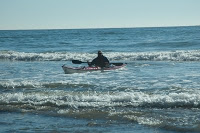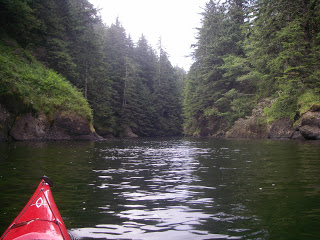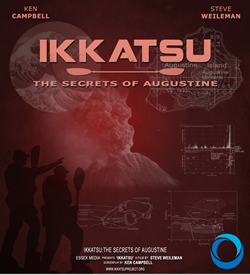When a stream or a river enters the sea, it forms a series of sand bars at the confluence. Because the flow of the river varies, and because it brings gravel, wood and silt with it as it makes its way to sea level, river mouths are of a type, really. Some are larger than others – the flow of water across the Columbia River bar is different than what rises and falls at the mouth of the Elwha – but the terrain is the same: sandy beaches, roiling, confused water and flat spots above the shore that seem made-to-order for a small tent and a driftwood-fired grill on a rocky hearth.
We had been eyeballing Goodman Creek as a possible camp spot, and although we still wanted to push on a few more miles to Mosquito Creek, we stayed in close as we came around the point.
And there it was. Goodman Creek merging with the Pacific, peacefully, gracefully. Like a dance, two different worlds intertwining. There were no waves; scattered rock gardens and a kelp forest farther out had seen to that. The flow from the creek was low and the mixing of the waters hardly seemed noticeable. Instead of sandy beaches with level uplands, the creek mouth was framed by rock. On the left as we approached, the cliff ran lower and ended to form one side of the creek’s exit. A stone pillar on the right outlined the the other.
We paddled through the creek mouth and within 60 seconds, all proof of the coast had disappeared.

We were, it seemed, kayaking on some remote mountain lake. Tall grasses came down to the water’s edge. Gravel bars were alive with songbirds. There were no cormorants, no seals, no oystercatchers here. At one point, we paddled up a small creek that fed into Goodman and worked our way to the base of a small waterfall. In almost no time at all, our perspective had completely changed.
The Cape Flattery section of the Olympic coast doesn’t have a place like this. The Ozette River has a grand entry, true, but you can’t ascend it in a kayak. The Quilleute, in La Push, has been fundamentally changed to accommodate fishing and other boat travel. This was a wild place that seemed to exist on a parallel plane, so close to the other one, but hard to get to. Except it wasn’t difficult at all.
We paddled back out to sea after a half-hour or so, watching the scenery change as we moved from fresh water back to the brine. The changes were subtle and before long, we were back out in the open ocean once again, making for our planned camp at Mosquito Creek.

When we got there, we surfed in through the little waves until our hulls struck sand. There were other campers here and with the trail crossing the creek at this point, it seemed like there were people everywhere. We raised a few eyebrows when we pulled a couple oilcans of Aussie beer out of the hatches (one of the clear advantages kayaking enjoys over backpacking), and strolled on the strand like princes loose in the kingdom.
Later, tents in place and a sliver of a moon hanging above the glowing horizon, we sat at the fire, listening to the crackling driftwood as it burned. The next morning we would get up late and break camp just before noon. Tide would be low in the early hours, and we didn’t have far to go.

We’d paddle around Hoh Head, another exquisite section of coastline where we’d play again in rock gardens and tidal chutes. We’d stop once, at the mouth of the Hoh River, where we’d give a half-gallon of water to a parched trio of backpackers. (We had seen them earlier in the day, attempting to round a steep, rocky point as the tide was rising. They made it, but hadn’t been near any drinking water all day). We’d end our trip at Ruby Beach, where a hundred or so tourists walked along the shore, and Mary and Micah awaited us with hugs and beer.
That night, with the sound of the creek running to the sea and the sparks from the fire rising into the starry sky, that night was enough. It had been an exhilarating day of kayaking, but it had been more than that. It had been the kind of a day that resides intact in memory. For life, I expect. It is as difficult to describe perfection as it is to define it, but once you’ve touched it, it can never be forgotten.
 We were, it seemed, kayaking on some remote mountain lake. Tall grasses came down to the water’s edge. Gravel bars were alive with songbirds. There were no cormorants, no seals, no oystercatchers here. At one point, we paddled up a small creek that fed into Goodman and worked our way to the base of a small waterfall. In almost no time at all, our perspective had completely changed.
We were, it seemed, kayaking on some remote mountain lake. Tall grasses came down to the water’s edge. Gravel bars were alive with songbirds. There were no cormorants, no seals, no oystercatchers here. At one point, we paddled up a small creek that fed into Goodman and worked our way to the base of a small waterfall. In almost no time at all, our perspective had completely changed. When we got there, we surfed in through the little waves until our hulls struck sand. There were other campers here and with the trail crossing the creek at this point, it seemed like there were people everywhere. We raised a few eyebrows when we pulled a couple oilcans of Aussie beer out of the hatches (one of the clear advantages kayaking enjoys over backpacking), and strolled on the strand like princes loose in the kingdom.
When we got there, we surfed in through the little waves until our hulls struck sand. There were other campers here and with the trail crossing the creek at this point, it seemed like there were people everywhere. We raised a few eyebrows when we pulled a couple oilcans of Aussie beer out of the hatches (one of the clear advantages kayaking enjoys over backpacking), and strolled on the strand like princes loose in the kingdom.  We’d paddle around Hoh Head, another exquisite section of coastline where we’d play again in rock gardens and tidal chutes. We’d stop once, at the mouth of the Hoh River, where we’d give a half-gallon of water to a parched trio of backpackers. (We had seen them earlier in the day, attempting to round a steep, rocky point as the tide was rising. They made it, but hadn’t been near any drinking water all day). We’d end our trip at Ruby Beach, where a hundred or so tourists walked along the shore, and Mary and Micah awaited us with hugs and beer.
We’d paddle around Hoh Head, another exquisite section of coastline where we’d play again in rock gardens and tidal chutes. We’d stop once, at the mouth of the Hoh River, where we’d give a half-gallon of water to a parched trio of backpackers. (We had seen them earlier in the day, attempting to round a steep, rocky point as the tide was rising. They made it, but hadn’t been near any drinking water all day). We’d end our trip at Ruby Beach, where a hundred or so tourists walked along the shore, and Mary and Micah awaited us with hugs and beer.










